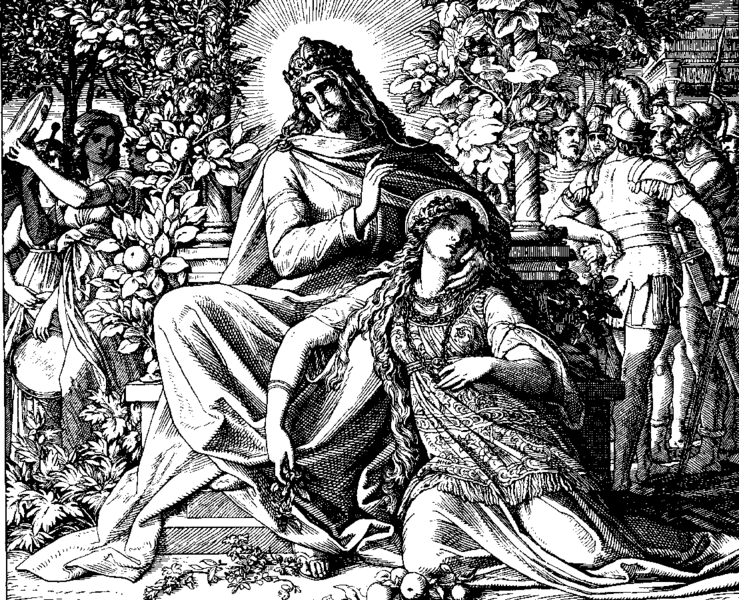An exhortation to those souls not just called, but especially chosen by God
Never forget dear brethren,
that the Lord your God hast delivered you from a lifestyle of vanity, and hast
set you firm upon the ways of righteousness. Perhaps you have been intoxicated by the whirls of Satan, the flesh and the world; perhaps you have escaped these evils in advance; or perhaps you currently are immersed in these fouls waters and are being called to live anew; regardless God has delivered you and God has chosen you. This exhortation is tailored for the first two types of soul noted above, yet if you are the latter, by God's grace you shall surely still draw profit; for if you are reading this, chosen you must be, it is just that you have not yet allowed your God to deliver you; so ask Him and ask Him swiftly with earnest and trusting desperation.
Now behold and look around you. Recall
to mind all the many people you have known from childhood until this day, look
and you will see, you will see that almost all of them live lives of debauchery,
of idolatry, of lust, of fornication, tepidity and emptiness. Is there but one
among them who does not strive after wind, after things that are base and vain?
Who among them prays? Who among them loves God? Who among them desires neither
wealth, nor power, nor glory, nor honour or respect? Behold o brother, behold o
sister; that you are a blessed soul indeed, for you are a gemstone surrounded
by dirt, a standing figure amongst a multitude of lifeless forms. Yet do not
congratulate yourself, do not puff yourself up in pride, for who are you to
deserve this honour, this privilege, this blessing and most tremendous grace of
being delivered from all waywardness and ignorance? Who are you indeed to
deserve the lot that has befallen you, the lot that has been given you from
above? O if these be wretches all around you, souls who are filled with every
misery and blindness; consider then how wretched you must be to have been especially
chosen by He? Think not because you are better than they that you have been
chosen, nay; for God does not choose in accordance with the natural motives
that sway man’s deliberations and favour. For rather God chooses what is base
and wretched in the sight of men, in order that His glory might shine forth
from such a shattered vessel, therefore confounding the wise and exalting the
lowly. Thus it is written: “God chose
what is foolish in the world to shame the wise, God chose what is weak in the
world to shame the strong” (1 Cor 1:27). Can there be therefore any greater
motive to love and give thanks to your God? A God who has dealt so ridiculously
kindly with you, to have redeemed you from the pits of hell to which you deserved?
A God who delivered you from that ignorance which clouds the sight of almost
all men? A God who lavished and continues to lavish you with every spiritual blessing
in the heavenly places? It is frustrating, so very frustrating, to be unable to
write in a manner which could at least motivate you to give but an ounce of the
infinite gratitude you should have for your God. But that matters not, ask for
the grace to be grateful and give thanks with the Holy Spirit, the Living
Thanksgiving that gushes forth from God the Father to God the Son, from God the
Son to God the Father.
O happy soul! O fortunate pandered
little wretch! What pleasure will be yours when you enter the fullness of
eternal bliss, where you shall truly realise how much you have been spoilt
above any other soul? Do you not realise that God has chosen you? That God has
chosen you precisely because you are miserable beyond compare? Why do not
despair, but praise your God for your wretchedness, that unsightliness which
has seduced your God to covet you in a most profound and unique manner. It
would be unthinkable to slouch in idleness and to chase worldly desires in
daydreaming bouts; for the Lord your God has chosen you, and therefore for
duties sake you are compelled to toil hard with the graces –the talents- that
He has given you. Yet do not serve your God out of mere duties sake, even
though a duty it is, for what wife wants to be romanced by a husband who acts
not from a genuine love but from a cold sense of duty? Ah but what to do? For
your heart is dead and numb and it is incapable of loving to any worthy degree
a God so great. Fear not o little chosen one, o little worm that God as a
hungry bird yearns to feast upon; for God is Love; and thus if you let Him
consume you into the blazing breast of His Love, then you shall become and be
filled with that Love Divine; rendering you capable of loving Him with His very
own Love!
And do not forget your Mother
o soul, for She has mourned much over you that you might obtain the blessings
that you possess now. Forget not also, that She beheld Her beautiful Son be
stripped bare, as a hunter skins its slaughtered prey. That She beheld Her
lovely Son be nailed with cold hard iron, in hands and feet -an act so barbaric
that any man would squirm if they beheld this done to naught else but a fox or
beaver- yet She was this poor man’s mother. And
lastly, forget not also, that She held within Her maternal arms the battered
corpse of He whom She first held as the sweetest of infants; He to whom She
nursed and cuddled with smiles and laughs. Yet then with tears and cries of
sorrow never heard by the ears of man either before or since, She caressed the
lifeless body of He Her Love. And why did She suffer such horrendous sights,
such torments and pains far greater than hell’s? To give birth to you
o soul, her sweet beloved child in Christ Her precious Son. And did She suffer
such for you to become a sluggard? For you to become a child who aims for
nothing high, but merely wishes to grow up to semi-stature? Why surely not! For
no mother yearns that her child should grow to become half the being that they
were destined to be; and so certainly not this Mother who is the Mother beyond
mothers. She gave spiritual birth to you on Calvary with the desire that you
would become a saint, that is, a soul who would live and die for naught else
but love of Jesus. So cast away your feeble desires and take hold of this
Divine Desire that palpitates in the Immaculate Heart of your Mother. This
Desire shall enflame you with Love Divine, and shall inspire in you the longing
to be unknown, that Christ might be known; to be forgotten, that Christ might
be remembered; and to die and to be dead, so that Christ would live in you and
in all.
O give thanks o fortunate
soul, for the Lord your God has dealt ever so kindly with you; so waste not His
blessings and pray fervently on behalf of those who know Him not. Do not judge
those who are not as blest as you, for even St. Francis wept over the fact that
had another been given the same graces as he, they would have fared much
greater than he. So remain little, remain small, and strive to become ever more
childish with confidence and loving joy. In this manner you shall let God be
your Greatness, your Love and the perpetual fancy of your heart. Now has not
your God being too good to you? Well ‘if it’s too good to be true, it can’t be
true’ they say; yet we know that this type of worldly thinking is utter idiocy,
for indeed when we reflect upon the graciousness of God we know ‘that if it’s
too good, it must be true’. This is grateful thinking, but now let us start
grateful living.







